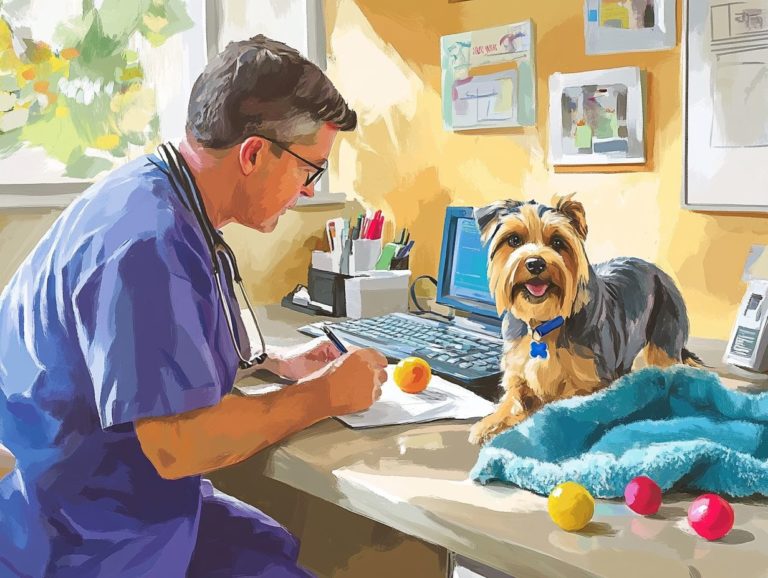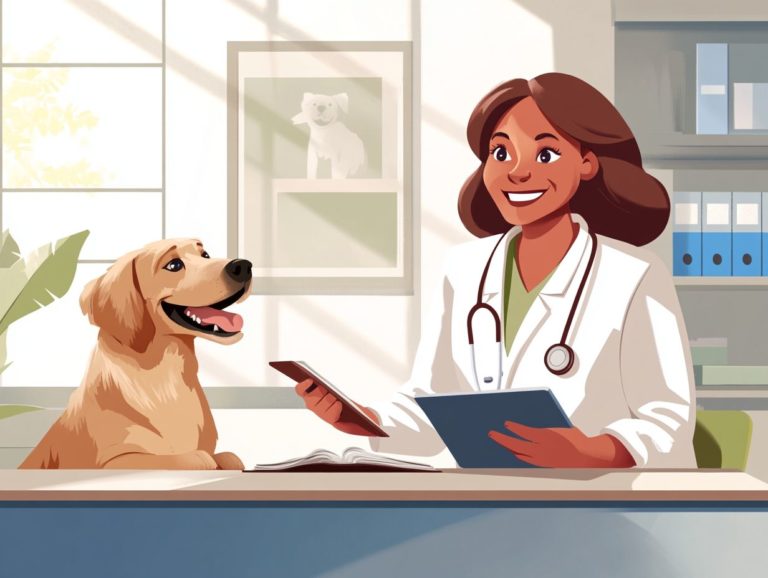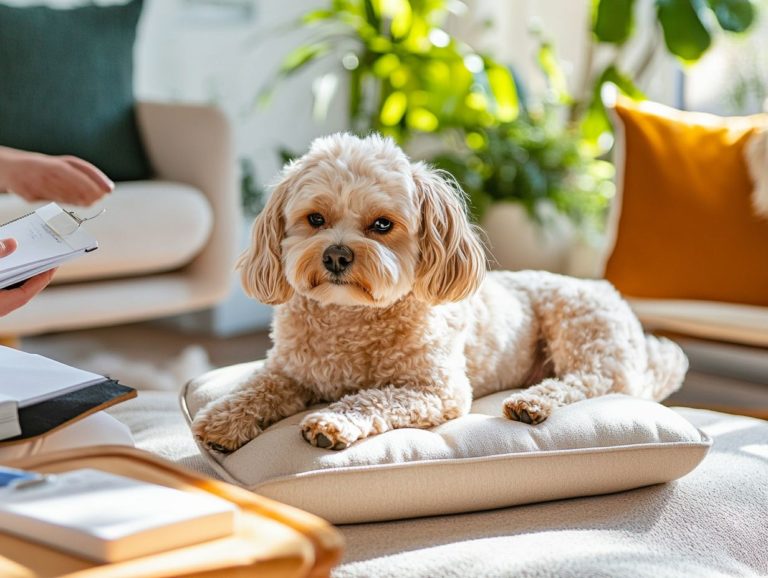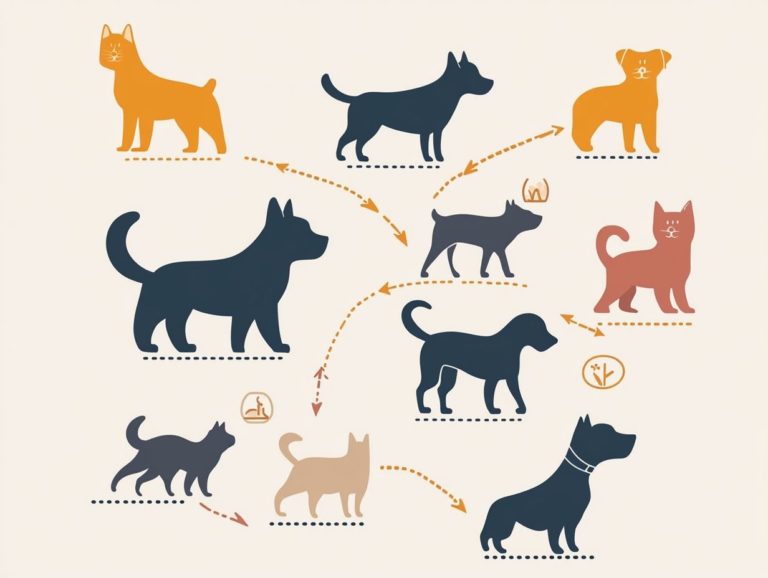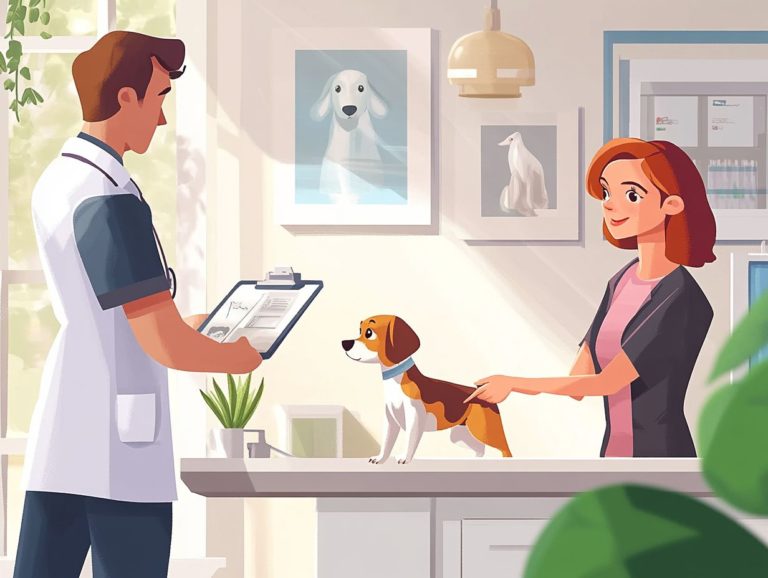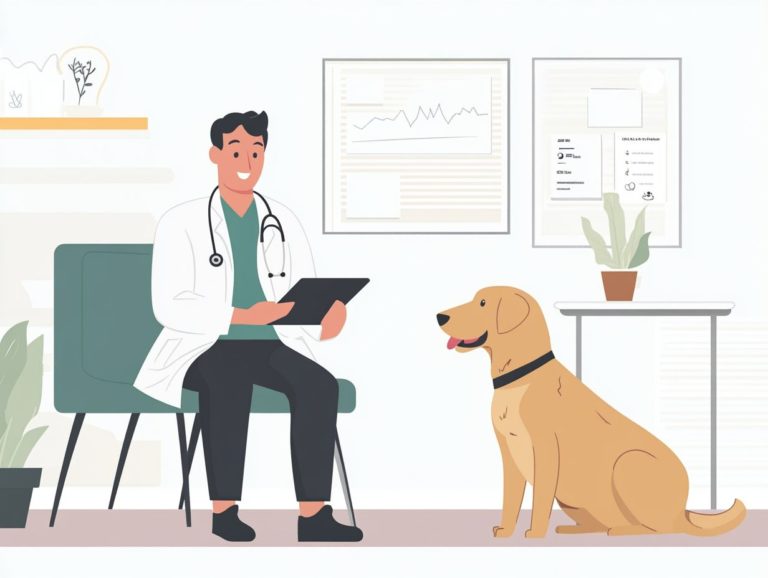How to Prepare for a Pet Anxiety Consultation
Pet anxiety is an increasingly prevalent issue for many pet owners, significantly impacting the well-being of your beloved companions.
Grasping the causes and symptoms of their anxiety is essential for helping them live happier lives. This guide will empower you to identify when it s time to seek professional assistance, what to expect during a consultation, and how to prepare effectively for the process.
You will discover various treatment options and strategies to support your pet’s recovery journey, ensuring you re fully equipped to provide the comfort they need.
Contents
- Key Takeaways:
- Understanding Pet Anxiety
- When to Seek a Consultation
- Preparing for the Consultation
- What to Expect During the Consultation
- Treatment Options for Pet Anxiety
- Supporting Your Pet After the Consultation
- Frequently Asked Questions
- What is a pet anxiety consultation?
- Why should I prepare for a pet anxiety consultation?
- How can I prepare for a pet anxiety consultation?
- What questions should I ask during a pet anxiety consultation?
- What should I expect during a pet anxiety consultation?
- How can I follow up after a pet anxiety consultation?
Key Takeaways:
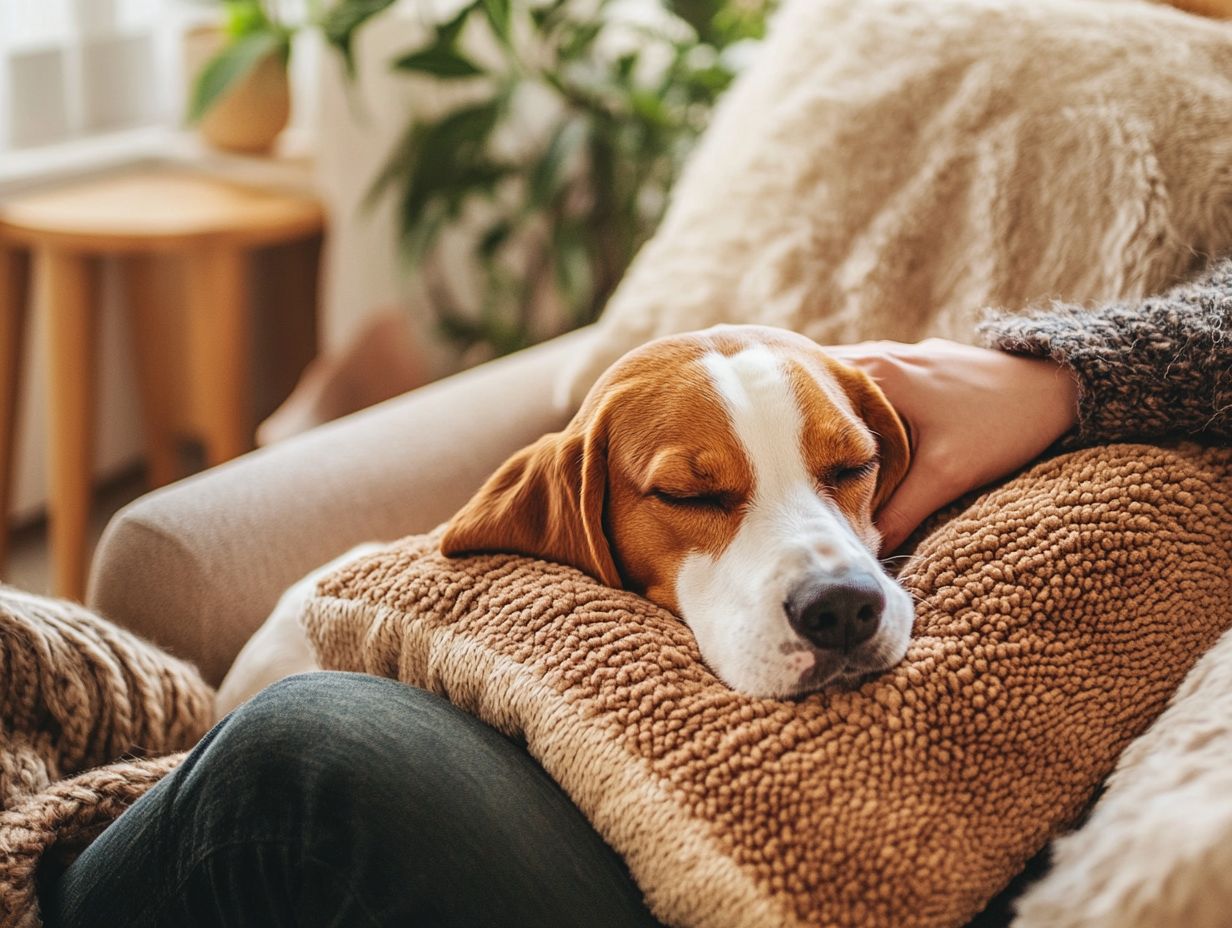
- Recognize the signs of pet anxiety and when it’s time to seek professional help.
- Prepare for a pet anxiety consultation by gathering information and observations about your pet’s behavior.
- Know what to expect during the assessment and explore different treatment options for your pet’s anxiety.
Understanding Pet Anxiety
Pet anxiety is a nuanced emotional response that many dogs experience. It can greatly affect their overall well-being and behavior.
As a pet owner, understanding this condition is vital, as it can manifest in various ways think barking, hiding, or even destructive tendencies.
Identifying the triggers of anxiety, such as loud noises, separation from you, or unfamiliar environments, is key to creating a supportive atmosphere for your pet during stressful situations, like visits to the vet.
By recognizing these signs and the underlying causes, you can take proactive measures to enhance your dog s quality of life and foster a healthier emotional state.
Causes and Symptoms
Causes of pet anxiety can vary widely. They are often rooted in environmental factors, genetics, or past traumatic experiences.
These triggers can include loud noises, like thunder or fireworks, which often send many pets into panic mode. A lack of socialization during critical developmental stages may lead to anxiety when encountering new situations or unfamiliar people.
Symptoms often manifest as excessive barking, destructive behavior, or even withdrawal from social interactions. For pets grappling with separation anxiety, the distress can intensify when they re left alone.
Older animals might show signs of confusion due to aging, where disorientation further elevates their anxiety levels. Understanding these causes and symptoms is crucial for effective management and support.
When to Seek a Consultation
Acting quickly when you notice anxiety symptoms is crucial for your pet’s happiness. If your dog’s anxiety symptoms escalate or linger despite your best calming efforts, it may be wise to consult a vet or a pet behavior specialist.
Regular visits to the vet can uncover any underlying health concerns that might be fueling their anxiety, allowing for the creation of a tailored treatment plan.
Early intervention not only improves your pet’s emotional resilience but also significantly enhances their quality of life.
Recognizing the Need for Professional Help
Recognizing the need for professional help is vital when your dog’s anxiety begins to interfere with their daily activities or overall quality of life. If you notice signs like excessive barking or destructive behavior, it s time to act!
Timely visits to the veterinarian can provide the necessary assessments and recommendations for training or treatment options. It s essential to explore interventions such as behavior modification techniques methods to help change your dog’s behavior and even medication.
This can significantly enhance your dog s mental well-being. Consulting with a knowledgeable vet will help you identify the best approach for your unique situation, ensuring a healthier and happier life for your beloved canine companion.
Preparing for the Consultation
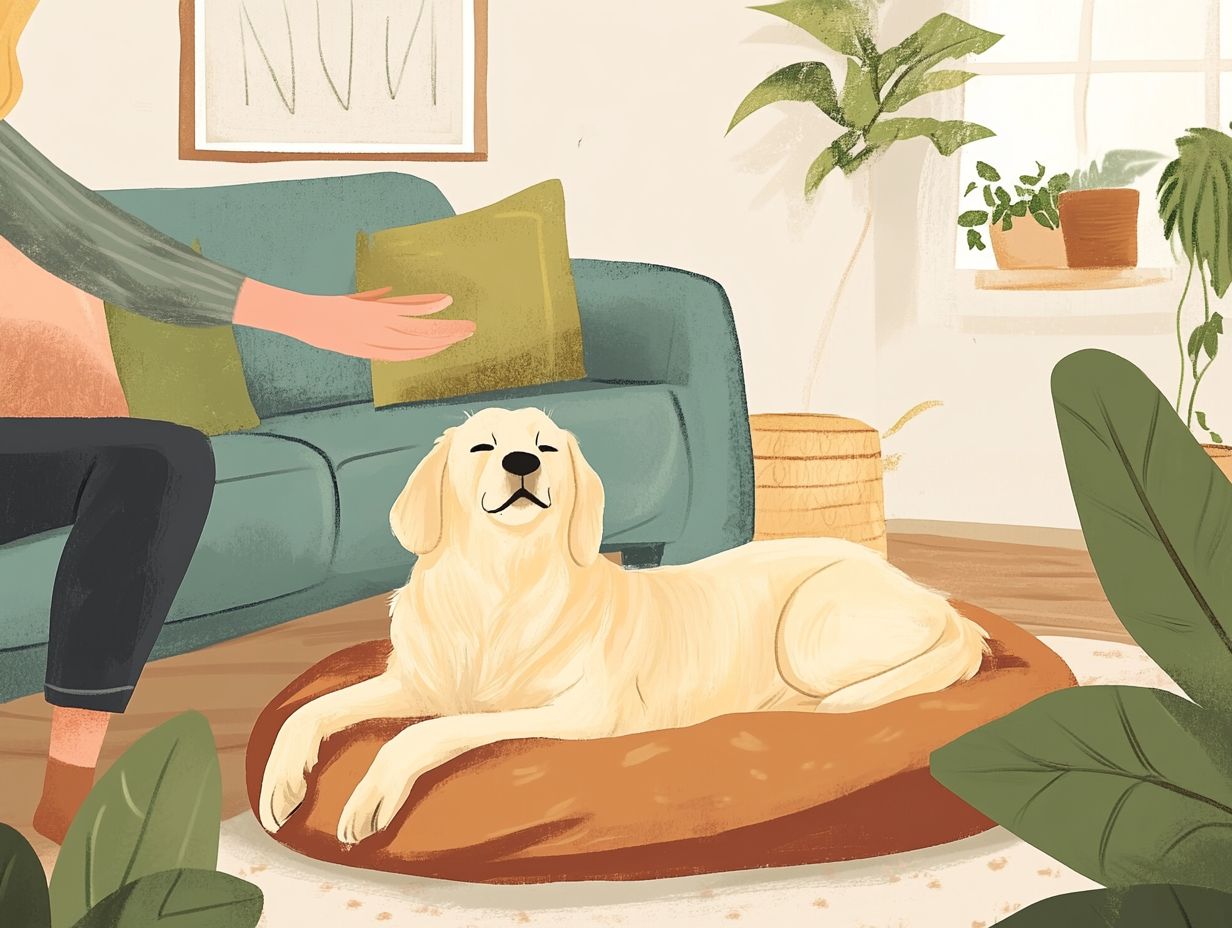
Preparing for a consultation about your dog’s anxiety is an important step that requires gathering relevant information and observations. This preparation is crucial because it helps the veterinarian understand your pet’s condition better. Before the appointment, consider reviewing the top questions to ask your pet anxiety specialist to ensure you cover all necessary topics.
Being well-prepared can make a huge difference in your consultation and the treatment that follows! It streamlines the examination process and aids in pinpointing patterns linked to your dog’s anxiety triggers. By documenting your pet’s behavior and any previous attempts at treatment, you equip the veterinarian with invaluable insights, which is why understanding the benefits of online consultations for pet anxiety can be so helpful.
Gathering Information and Observations
Gathering detailed observations about your dog’s behavior and anxiety symptoms is essential as you prepare for a consultation with a veterinarian.
Consider noting specific triggers that provoke anxiety, such as loud noises, new people, or changes in routine. It s important to record your dog s emotional responses in these situations perhaps whimpering, hiding, or even destructive behavior.
By keeping a log of these details over time, you gain a more nuanced understanding of your dog s unique fears and responses. This comprehensive record will help the veterinarian create an effective treatment plan, which may include training that helps change your dog’s responses to anxiety or medications that can help reduce anxiety.
What to Expect During the Consultation
During a consultation for pet anxiety, you can expect a thorough veterinary examination tailored to uncover your dog’s unique needs and challenges. The veterinarian will evaluate your dog’s behavior and emotional reactions to various stimuli, engaging in a detailed discussion about observed symptoms and any prior information you’ve shared. For more insights, refer to this guide on how to seek help for your anxious pet.
They may also suggest specific anxiety treatment options, including handling and training exercises crafted to reduce your pet’s stress and enhance their overall behavior. Understanding the role of family in pet anxiety consultations is a vital step toward helping your dog feel better—don’t miss it!
Common Assessment Methods
During a veterinary consultation for anxiety, you may encounter common assessment methods such as behavioral evaluations and structured handling exercises. These techniques allow the veterinarian to closely observe your pet’s reactions in various situations, helping identify specific triggers that might induce distress. For more insights, check out what makes an effective pet anxiety counselor.
For instance, the vet might create controlled environments to see how your dog responds to unfamiliar sounds or novel objects. Effective communication with the veterinarian is crucial; share detailed accounts of your pet’s behavior at home to reveal patterns and deepen the understanding of their symptoms.
With this comprehensive insight, the vet can craft a tailored treatment plan that may include behavioral training, environmental modifications, or medications, all aimed at achieving a holistic approach to your pet s well-being.
Treatment Options for Pet Anxiety
Treatment options for pet anxiety can vary significantly depending on your dog s unique needs. You might explore a range of solutions, including medications that can help reduce anxiety, training that focuses on positive reinforcement, and natural calming aids.
Many pet owners find success with a blend of calming techniques and training exercises. For example, incorporating calming aids like CBD oil and other therapies may markedly alleviate anxiety symptoms for some dogs.
It s essential to tailor each treatment plan to address specific anxiety triggers, ensuring a holistic approach to your pet’s health and emotional well-being.
Medication, Therapy, and Alternative Approaches
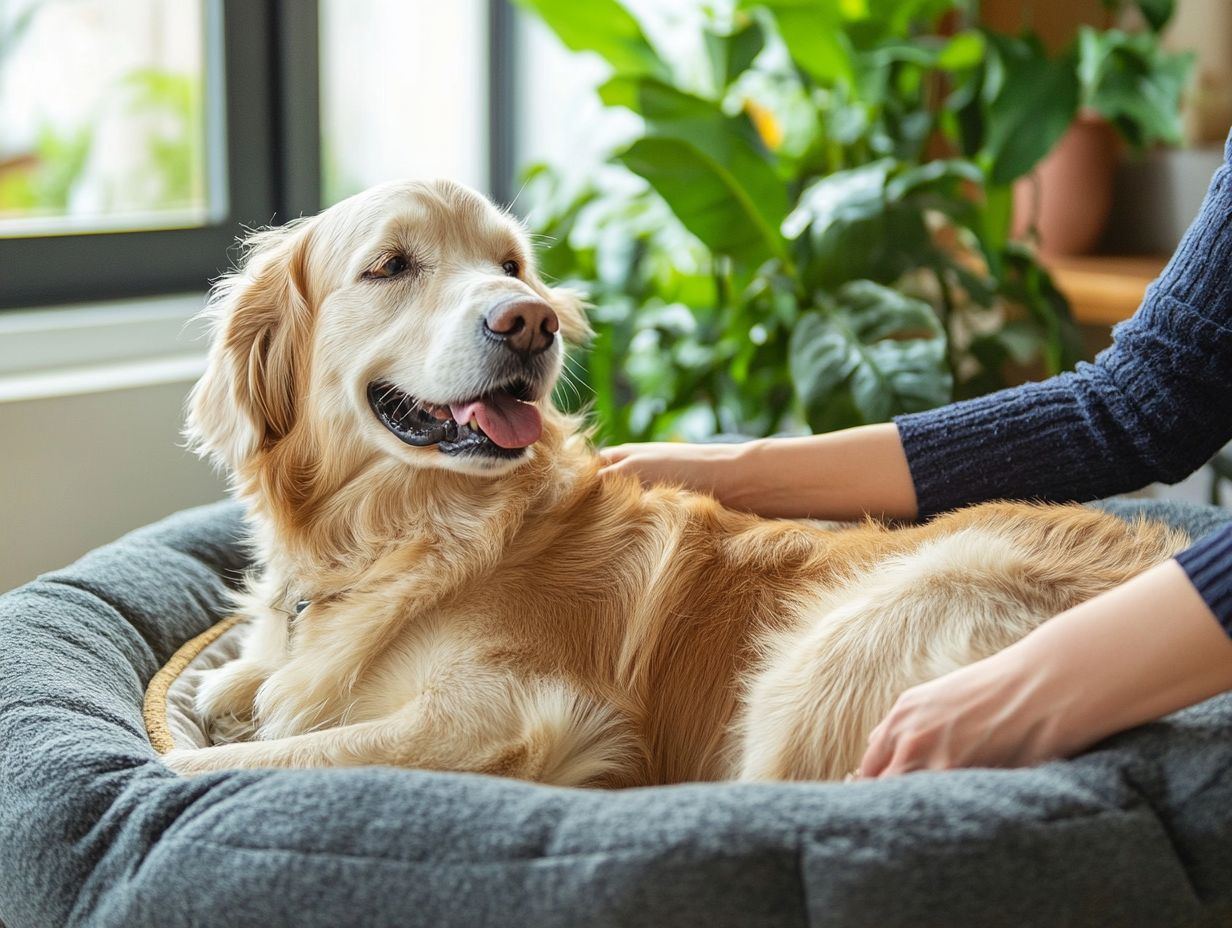
Medication, therapy, and alternative approaches form the backbone of a comprehensive anxiety treatment plan for your pets.
Addressing anxiety in animals often requires a nuanced strategy tailored to their specific needs. Medications prescribed by your veterinarian can provide immediate relief from symptoms. However, they may also carry potential side effects like drowsiness or gastrointestinal upset.
Therapy, especially training methods, plays a vital role in equipping your pets with effective coping strategies during stressful moments.
You might explore alternative solutions, such as calming aids that include pheromone diffusers and specialized anxiety wraps. Additionally, natural remedies like CBD (Cannabidiol) oil are gaining recognition for promoting relaxation without the psychoactive effects of THC (Tetrahydrocannabinol). Each of these options offers unique benefits and can work together, creating a more tranquil environment for your anxious pets.
Supporting Your Pet After the Consultation
Supporting your pet after the consultation is essential for reinforcing the strategies your veterinarian has recommended. Actively implementing these strategies can significantly lower the chances of anxiety relapses.
Once you’ve identified the specific anxiety treatment plan, it’s important to diligently apply handling exercises and positive reinforcement techniques. This will help your dog adapt and cope with anxiety triggers effectively.
Your ongoing commitment to this process can foster a more stress-free environment and improve overall behavior. This ensures that your dog feels secure and supported in their daily life.
Implementing Strategies and Coping with Relapses
Implementing strategies to address your dog’s anxiety is essential, especially when faced with the possibility of relapses. Pet care experts highlight the significance of consistent training that utilizes positive reinforcement techniques, creating a nurturing environment for anxious dogs.
By incorporating methods such as clicker training or rewarding your pet with treats for responding positively to stimuli, you can effectively cultivate a sense of security for them. Recognizing the signs of anxiety is crucial. If your dog suddenly becomes withdrawn or overly alert, it may be a sign of stress.
In these moments, it s important to revisit the foundational training steps and reinforce good behavior. This ensures that supportive measures are firmly in place to prevent any setbacks.
Frequently Asked Questions
What is a pet anxiety consultation?
A pet anxiety consultation is a meeting with a behaviorist or veterinarian to discuss your pet’s anxiety and know when to consult a professional to develop a treatment plan to help them cope.
Why should I prepare for a pet anxiety consultation?
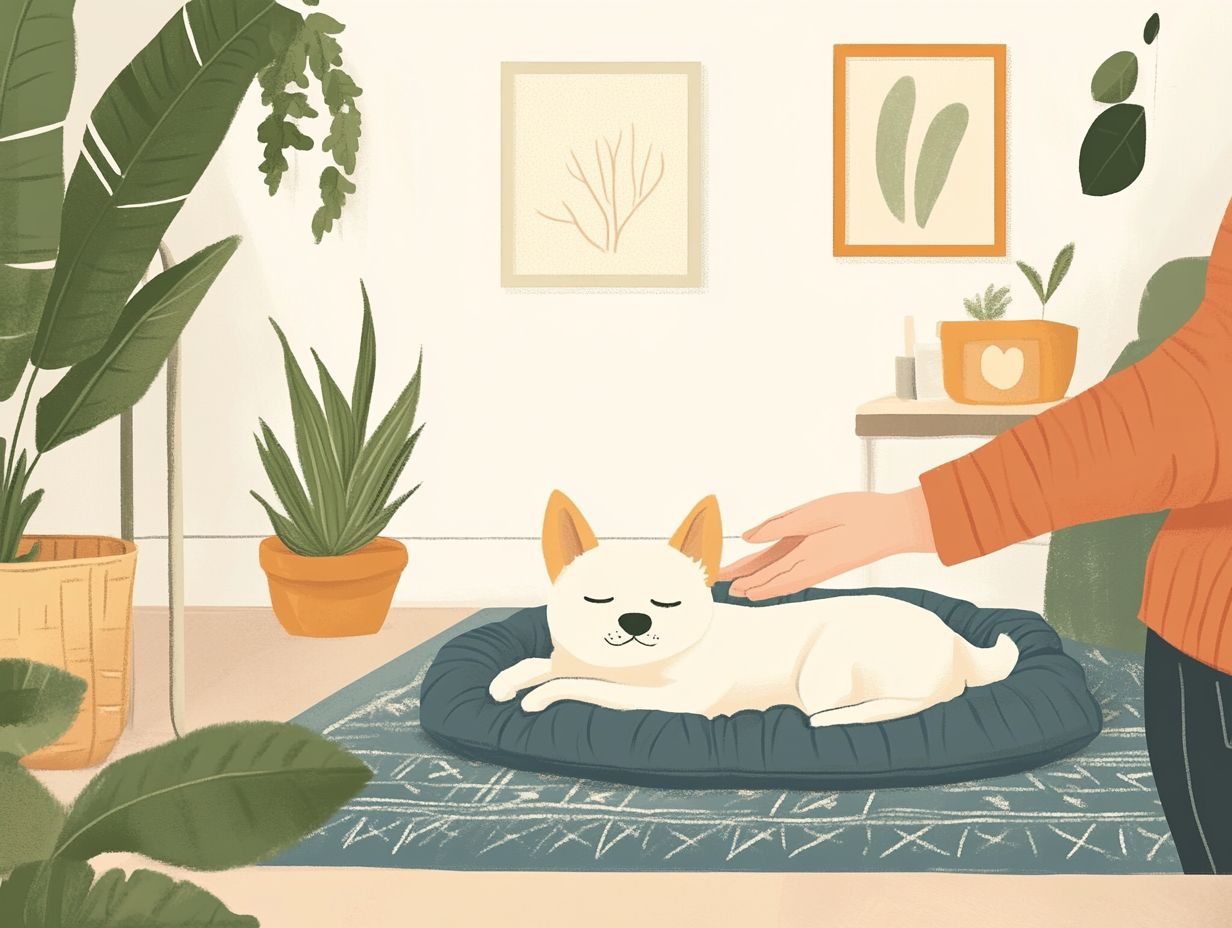
Preparing for a pet behavior consultation can help you make the most out of the meeting and ensure that you and your pet get the best care and support.
How can I prepare for a pet anxiety consultation?
To prepare for a pet anxiety consultation, gather any relevant medical records, write down a list of your pet’s symptoms and triggers, and be ready to discuss your pet’s behavior and daily routine. It’s also helpful to know what to expect during a pet anxiety assessment to ensure a productive visit.
What questions should I ask during a pet anxiety consultation?
Some helpful questions to ask during a pet anxiety consultation include: What is causing my pet’s anxiety? What treatment options are available? Curious about the best treatment options for your pet? How long will it take for my pet to see improvement?
What should I expect during a pet anxiety consultation?
During a pet anxiety consultation, the behaviorist or veterinarian will likely ask you questions about your pet’s behavior, perform a physical exam, and may recommend additional tests or observations. Understanding the role of veterinary advice in managing pet anxiety can also help you navigate this process effectively.
How can I follow up after a pet anxiety consultation?
After a pet anxiety consultation, be sure to follow any instructions or recommendations given by the behaviorist or veterinarian. To better understand your pet’s needs, refer to how to recognize and address anxiety in pets, schedule any follow-up appointments, and continue to monitor your pet’s behavior for improvement or changes.

